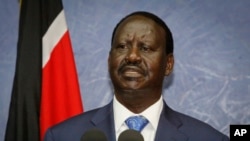Kenya’s presidential spokesperson is questioning a demand by former prime minister and main opposition leader Raila Odinga for dialogue with President Uhuru Kenyatta’s government by July 7.
Odinga also wants the administration to come up with a timetable for the withdrawal of the country’s troops from neighboring Somalia, where soldiers have been battling the Islamist militant group al-Shabab.
Manoah Esipisu says the opposition leader’s demands are outside of the provisions enshrined in the constitution, which he said provides avenues for dialogue as part of an effort to resolve challenges the country faces.
“It’s one of those demands one looks at and wonders why there should be any demands in the first place,” said Esipisu. “We do believe that we are not in a position where Mr. Odinga could be asking for a forum outside from those ones that are allocated within the constitution.”
Supporters of the former prime minister say the government should take advantage of the demands for dialogue, which they argue could be used to lessen ethnic divisions and tension that often lead to violence.
Esipisu says the administration welcomes any advice that could help find solutions to resolve the country’s challenges, but adds that the opposition leader’s demand for dialogue with subsequent ultimatum is unfortunate.
“If you want to be part of the inclusive nature of dialogue that leads to something then you cannot be attempting to force that dialogue to happen. I think you’ve got to be respectful about it you’ve got to be civil about it,” said Esipisu.
Supporters of the government have accused the opposition leader of trying to foment trouble by creating tension to destabilize the country following his demand for dialogue, despite accepting defeat in Kenya’s last general election.
Meanwhile, some analysts have called for a full scale investigation and the prosecution of community leaders and politicians who are alleged to have incited the youth to violence that led to recent ethnic clashes in parts of the country.
Esipisu says the government has increased security presence in areas which recently saw ethnic clashes.
“Investigations are underway in areas where these have happened. The government does take these things seriously,” said Esipisu. “In Lamu, for instance, we have sent hundreds of police reinforcement to comb the area, bring the perpetrators of this violence to justice.”
“We have in quite a few instances, our director of public prosecution have asked quite a number of politicians to report to police stations to record statements about the speeches that are considered hate speech or hate mongering,” said Esipisu. “Those that are found to be guilty of these offenses will be dealt with in terms of the law.”
Odinga also wants the administration to come up with a timetable for the withdrawal of the country’s troops from neighboring Somalia, where soldiers have been battling the Islamist militant group al-Shabab.
Manoah Esipisu says the opposition leader’s demands are outside of the provisions enshrined in the constitution, which he said provides avenues for dialogue as part of an effort to resolve challenges the country faces.
“It’s one of those demands one looks at and wonders why there should be any demands in the first place,” said Esipisu. “We do believe that we are not in a position where Mr. Odinga could be asking for a forum outside from those ones that are allocated within the constitution.”
Supporters of the former prime minister say the government should take advantage of the demands for dialogue, which they argue could be used to lessen ethnic divisions and tension that often lead to violence.
Esipisu says the administration welcomes any advice that could help find solutions to resolve the country’s challenges, but adds that the opposition leader’s demand for dialogue with subsequent ultimatum is unfortunate.
“If you want to be part of the inclusive nature of dialogue that leads to something then you cannot be attempting to force that dialogue to happen. I think you’ve got to be respectful about it you’ve got to be civil about it,” said Esipisu.
Supporters of the government have accused the opposition leader of trying to foment trouble by creating tension to destabilize the country following his demand for dialogue, despite accepting defeat in Kenya’s last general election.
Meanwhile, some analysts have called for a full scale investigation and the prosecution of community leaders and politicians who are alleged to have incited the youth to violence that led to recent ethnic clashes in parts of the country.
Esipisu says the government has increased security presence in areas which recently saw ethnic clashes.
“Investigations are underway in areas where these have happened. The government does take these things seriously,” said Esipisu. “In Lamu, for instance, we have sent hundreds of police reinforcement to comb the area, bring the perpetrators of this violence to justice.”
“We have in quite a few instances, our director of public prosecution have asked quite a number of politicians to report to police stations to record statements about the speeches that are considered hate speech or hate mongering,” said Esipisu. “Those that are found to be guilty of these offenses will be dealt with in terms of the law.”




